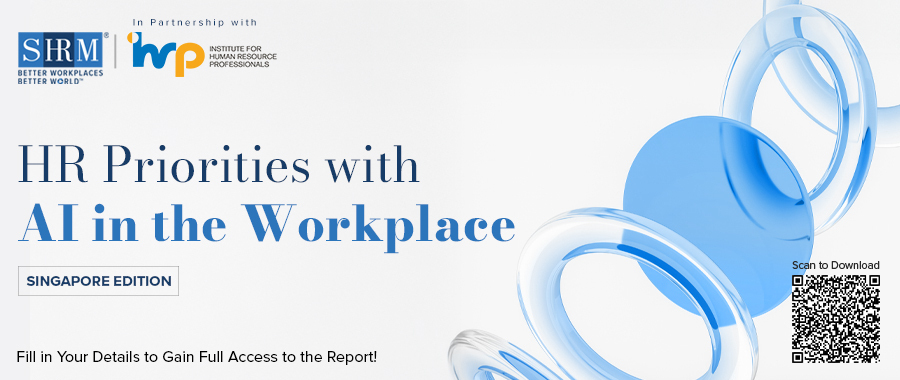The AI revolution isn’t coming — it’s already here! And nowhere is this clearer than in HR, where technology reshapes how organizations hire, manage, and support their people. At a recent SHRM panel at AI & the Future of Work—A Leadership Dialogue in Singapore featuring Ahmed Mazhari, former President of Microsoft Asia; Aslam Sardar, CEO of IHRP; and Achal Khanna, CEO of SHRM India, APAC, and MENA, leaders weighed in on AI’s role in transforming the workplace.
The Urgency of Adopting AI
AI is no longer optional — it’s essential. Whether to adopt AI today is like asking if you can work without a computer. The world is moving at a speed even faster than the Industrial Revolution or the rise of the internet. The cost of hesitation isn’t just falling behind competitively — it’s organizational irrelevance.
For HR leaders, the message is clear: it’s time to build AI fluency and bring leadership along for the ride. Every decision-maker, from CEOs to board members, must understand AI’s capabilities and limitations. AI isn’t just an IT issue; it’s imperative for business and workforce strategy.
 Creating an AI-Ready Organization
Creating an AI-Ready Organization
Building AI capability starts with culture. Leaders need to champion experimentation. Implement AI tools in low-risk areas — resume screening, meeting scheduling, internal surveys — and let people see how it improves workflow. Organizations today are deploying AI co-pilots across the company, not just for senior leadership. The result? More confidence, curiosity, and adoption.
It’s also about closing generational divides. While younger employees may embrace AI naturally, older staff might resist. HR’s role is to lead with empathy, offer training, and create opportunities for everyone to engage. AI innovation centers and sandbox environments for internal experimentation are a great way to nurture this shift.
AI Goes beyond Recruitment
AI has already proven its worth in recruitment, scanning resumes, matching candidates to roles, and even conducting initial video interviews. However, AI alone isn’t enough. Algorithms can carry bias, and bad hires or missed opportunities are inevitable without human oversight.
A standout example shared involved an AI tool initially dismissing a former chef applying for an HR business partner role. Human intervention recognized that skills like budgeting, team management, and operations are highly transferable, and that the candidate is now leading a country operation.
Beyond recruitment, AI has proven its worth to optimize workforce planning, learning and development, and employee engagement by analyzing patterns and predicting needs, but always with a human-in-the-loop approach.
It’s time for organizations and HR teams to identify use cases and opportunities for deploying AI in specific HR functions to leverage its potential.
Collaboration: AI + Human Intelligence (HI)
AI is powerful, but it lacks context, empathy, and moral judgment. The future isn’t AI replacing people—it’s AI augmenting people. That means AI will handle repetitive, data-heavy tasks while humans focus on strategic, creative, and relational work.
The panel referenced Reinforced Learning through Human Feedback (RLHF) as a model for refining AI decisions with human insight. It’s not about AI taking over, but about people and machines collaborating to deliver better, fairer, and faster outcomes.
Building Trust and Overcoming Fear
Employee fear is a natural response to disruptive technology. Many worry AI will eliminate jobs or make them obsolete. The antidote is transparency and continuous education.
HR needs to openly communicate how AI will be used and involve employees in the process. Highlight examples of AI removing tedious tasks, improving decision-making, and offering new growth opportunities. It’s important to start small with AI experiments and build success stories that employees can rally behind.
Creating forums where employees can ask questions, voice concerns, and share experiences will help build psychological safety around AI adoption.
The Need for AI Governance
With AI’s power comes responsibility. Unchecked, AI systems can amplify bias, make errors, and erode trust. The panel stressed the importance of a clear, actionable AI governance framework.
This means defining how AI tools are selected, tested, monitored, and retired. It also requires clear accountability for AI-driven decisions and mechanisms to review and correct outcomes when needed. "Go slow to go " fast"—thoughtful implementation today prevents reputational and operational crises tomorrow.
The Future of AI in HR
We’re only at the beginning of AI’s impact on HR. In the near future, expect AI to assist in personalized employee development plans, well-being monitoring, workforce sentiment analysis, and predictive workforce planning.
The most successful HR leaders will be those who continuously learn, experiment, and adapt. By balancing AI’s analytical strengths with human empathy and judgment, organizations can future-proof their workforce and create workplaces that are not only efficient but also inclusive and human-centered.
In Conclusion
The message from the SHRM panel was clear — AI is transforming HR at lightning speed. The choice isn’t whether to adopt it but how to adopt it responsibly, inclusively, and strategically. The time to act is now.
As part of this ongoing commitment, SHRM and IHRP also launched the "HR Priorities with AI in the Workplace—Singapore Edition" report at the event, offering valuable insights to guide HR leaders on this transformative journey.
Download link: Click here





